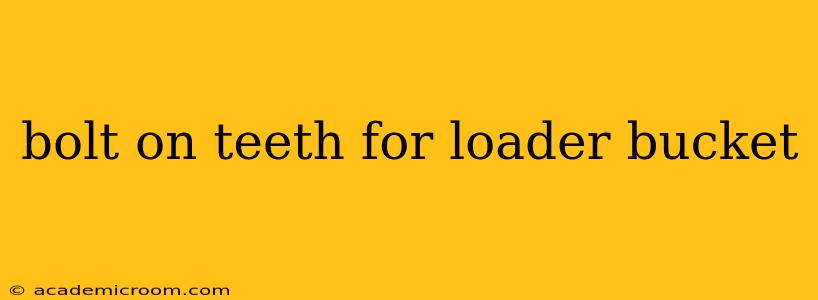Choosing the right bolt-on teeth for your loader bucket is crucial for maximizing efficiency and minimizing downtime. This guide explores everything you need to know, from understanding different types to selecting the perfect fit for your application. Whether you're tackling tough demolition projects or everyday material handling, having the correct teeth can significantly impact your productivity and the lifespan of your bucket.
What are Bolt-On Teeth?
Bolt-on teeth are replaceable cutting edges attached to the lip of a loader bucket. Unlike welded teeth, they're secured using bolts, making them easily replaceable when worn down. This significantly reduces repair costs and downtime compared to replacing entire bucket lips. They are designed to withstand significant impact and abrasion, offering superior durability and performance in demanding applications. This makes them a cost-effective and efficient solution for maintaining optimal bucket performance.
Different Types of Bolt-On Teeth: Which is Right for You?
Several factors determine the best type of bolt-on tooth for your needs, including the material you're handling, the intensity of the work, and the type of loader you're using. Here are some of the most common types:
Material:
-
High-Carbon Steel: This is the most common material due to its excellent strength and durability at a relatively lower cost. It's ideal for general-purpose applications involving various materials.
-
Alloy Steel: Offers enhanced hardness and wear resistance compared to high-carbon steel, making it suitable for abrasive materials like rock and concrete. The increased durability often justifies the higher cost.
-
Hardened Steel: This option provides the highest level of wear resistance, perfect for extremely demanding applications involving very hard materials. It comes with the highest price tag, but the extended lifespan can be worth the investment.
Tooth Design:
-
Standard Teeth: These are the most common and versatile teeth, suitable for a wide range of applications.
-
Heavy-Duty Teeth: Designed for heavier loads and more aggressive material handling. They offer increased durability and resistance to breakage.
-
Special Application Teeth: This category includes teeth designed for specific materials or applications, such as digging teeth for rocky terrain or narrow teeth for precise work.
Tooth Retention:
While most bolt-on teeth use standard bolts, some manufacturers offer systems with enhanced retention features to prevent teeth from being dislodged during heavy use. These might include locking mechanisms or specialized bolt designs.
How to Choose the Right Bolt-On Teeth for Your Loader Bucket?
Selecting the appropriate bolt-on teeth requires careful consideration. Factors to include are:
-
Material Being Handled: Are you working with soil, gravel, rock, or something else entirely? The hardness and abrasiveness of the material will dictate the necessary hardness and wear resistance of the teeth.
-
Application: Demolition work requires different teeth than moving topsoil. Consider the intensity and type of work.
-
Bucket Size and Type: Ensure the teeth are compatible with your specific bucket size and type. The mounting pattern and dimensions must match precisely.
-
Budget: The material and design of the teeth directly impact their price. Balance cost with the expected lifespan and performance.
How to Install Bolt-On Teeth?
Installation typically involves removing worn teeth, cleaning the mounting area, and then securely attaching the new teeth using the appropriate bolts and washers. Always refer to the manufacturer's instructions for precise steps and torque specifications.
How Often Should Bolt-On Teeth Be Replaced?
The lifespan of your bolt-on teeth will depend heavily on the factors mentioned above. Frequent inspection is crucial. Replace them when you notice significant wear, chipping, or damage that could impact performance or safety. Regular maintenance and timely replacements extend the life of your bucket and prevent costly repairs down the line.
What are the Benefits of Using Bolt-On Teeth?
-
Cost-Effective: Replacing individual teeth is far cheaper than replacing entire bucket lips.
-
Reduced Downtime: Quick and easy replacement minimizes operational interruptions.
-
Increased Productivity: Sharp, effective teeth ensure efficient material handling.
-
Enhanced Safety: Well-maintained teeth improve control and prevent unexpected damage or failure.
-
Extended Bucket Lifespan: Properly maintaining teeth protects the bucket itself from premature wear and tear.
What are the alternatives to Bolt-On Teeth?
While bolt-on teeth are the most common solution, welded teeth offer an alternative. However, these require more extensive repair procedures and can be less cost-effective in the long run. They are generally a better solution for applications where extreme durability is critical and frequent replacement isn't practical.
By carefully considering these factors and selecting the appropriate bolt-on teeth, you can significantly enhance your loader's performance, efficiency, and longevity. Remember to always prioritize safety and follow manufacturer recommendations for installation and maintenance.
